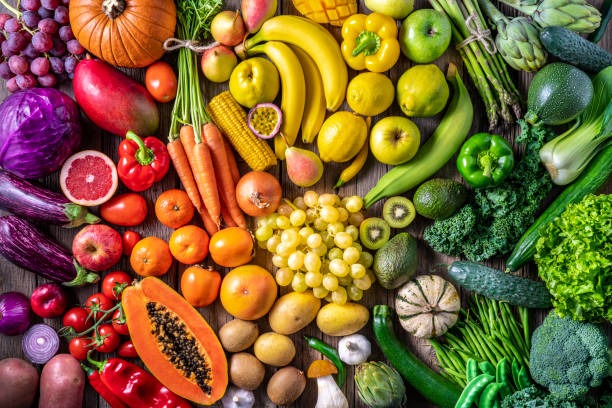Children's Diet and Nutrition (0-6 Years) : A Complete Guide
2/8/20246 min read


The first six years of a child's life are critical for growth, development, and overall health. In India, where diverse regional foods and cultural practices exist, ensuring that children receive the right nutrition is key to supporting their physical and cognitive development. This blog post will explore the essential components of a child's diet, with a focus on the importance of fruits, vegetables, and other nutritional aspects specific to India.
1. Importance of Nutrition in the First Six Years
The first 1000 days of a child’s life, from conception to two years of age, are particularly crucial for growth and development. During these years, a child’s brain, immune system, and organs develop rapidly. In India, however, malnutrition continues to be a major challenge, with many children undernourished or suffering from stunting and micronutrient deficiencies.
Good nutrition during the first six years can:
Support physical growth and development
Boost cognitive and emotional development
Strengthen the immune system
Prevent childhood diseases and infections
Lay the foundation for a healthy adult life
Thus, a balanced diet with the right proportions of macronutrients (carbohydrates, proteins, and fats) and micronutrients (vitamins and minerals) is critical.
2. The Role of Breast Milk: The First Food
In India, breastfeeding is considered the best form of nourishment for newborns. Exclusive breastfeeding (feeding only breast milk without any other food or drink) for the first six months is strongly recommended by healthcare professionals. Breast milk is packed with all the essential nutrients a baby needs during this initial period. It provides:
Proteins for growth and development
Fats for brain and eye development
Vitamins and minerals to boost immunity
Antibodies that protect against infections
Despite the growing popularity of infant formula, breastfeeding continues to be the most important nutritional source during the first six months.
3. Introducing Solid Foods (6-12 Months)
After six months, breast milk alone is no longer sufficient to meet a baby’s growing nutritional needs. The introduction of solid foods should be gradual. Traditionally in India, we introduce foods like:
Rice porridge (Khichdi): Made with rice, lentils, and mild spices, this is easy to digest and offers a balanced mix of carbohydrates, protein, and fats.
Dal (Lentil Soup): A rich source of protein and iron, essential for growth.
Mashed vegetables: Soft, boiled vegetables like carrots, sweet potatoes, and pumpkin are rich in vitamins and minerals.
Fruits: Pureed or mashed fruits like banana, apple, and papaya provide essential vitamins, fiber, and antioxidants.
It's essential to continue breastfeeding alongside these solids, as it provides necessary hydration and nutrients.
4. Fruits and Vegetables for Optimal Growth
In India, a wide variety of seasonal fruits and vegetables are available throughout the year. Ensuring children consume enough fruits and vegetables is critical for their health.
Fruits
Fruits are rich in essential vitamins like Vitamin C, Vitamin A, and folic acid, as well as antioxidants that help boost immunity. Some ideal fruits for young children include:
Bananas: Packed with potassium, fiber, and energy-boosting carbohydrates. Bananas are easy to digest and help regulate digestion.
Apples: Rich in Vitamin C and fiber, apples are great for improving immunity and digestion.
Papayas: Loaded with Vitamin A and digestive enzymes, papayas help in boosting immunity and improving digestion.
Mangoes: Known as the "king of fruits," mangoes are rich in Vitamin A, Vitamin C, and antioxidants, promoting healthy skin and vision.
Pears: High in fiber and low in acidity, pears are gentle on the stomach and help with digestion.
Vegetables
Vegetables are the cornerstone of a balanced diet, providing the necessary vitamins, minerals, fiber, and antioxidants for growth and development. Some vegetables that are especially important for children include:
Spinach (Palak): High in iron and folic acid, spinach helps in red blood cell production and supports brain development.
Carrots: Rich in Vitamin A, carrots promote good eyesight and healthy skin.
Pumpkin: Packed with Vitamin A and fiber, pumpkin aids in digestion and boosts immunity.
Sweet Potatoes: A rich source of carbohydrates, Vitamin A, and fiber, they support overall growth and development.
Tomatoes: High in Vitamin C and antioxidants like lycopene, tomatoes help in immunity and skin health.
In Indian cuisine, many vegetables like bhindi (okra), bottle gourd, cauliflower, and cabbage are often used in different forms, making it easy to introduce them into a child's diet.
5. Protein-Rich Foods for Muscle Development
Protein is essential for muscle and tissue development in children. Protein-rich foods that are commonly available in India include:
Lentils (Dal): India is home to a variety of lentils, including toor dal, moong dal, masoor dal, and chana dal. These provide an excellent source of plant-based protein.
Paneer (Cottage Cheese): Paneer is an excellent source of protein and calcium, vital for bone health.
Eggs: Eggs are rich in high-quality protein and essential vitamins like Vitamin D and B12.
Chicken and Fish: Non-vegetarian foods like chicken and fish are rich in proteins and omega-3 fatty acids, important for brain development.
As a vegetarian nation, many Indian families rely on plant-based sources of protein like legumes, pulses, and dairy.
6. Importance of Healthy Fats
Healthy fats are necessary for brain development, growth, and energy production. Some sources of healthy fats in an Indian diet include:
Ghee: Traditionally used in Indian cooking, ghee is a source of saturated fat that is beneficial when consumed in moderation.
Coconut oil: Rich in medium-chain triglycerides (MCTs), coconut oil supports energy production and brain function.
Nuts and seeds: Almonds, walnuts, flaxseeds, and chia seeds provide essential fatty acids, antioxidants, and protein.
Avocados: Known for their healthy monounsaturated fats, avocados are great for brain development and skin health.
7. Dairy for Bone Health
Calcium is vital for developing strong bones and teeth. In India, dairy products are a primary source of calcium and protein for children. These include:
Milk: Full-fat milk is a great source of calcium, protein, and essential fats. It is important to introduce milk to children after one year.
Curd (Yogurt): Rich in probiotics, curd aids digestion and boosts immunity. It also provides calcium and protein.
Cheese: While not commonly consumed in large quantities in traditional Indian diets, cheese (especially paneer) is a good source of calcium and protein.
8. Micronutrients: Vitamins and Minerals
Micronutrients like vitamins and minerals are critical for growth, immunity, and overall well-being. Some important micronutrients for children include:
Vitamin A: Found in foods like carrots, pumpkin, spinach, and mango, Vitamin A is crucial for healthy vision and skin.
Iron: Iron-rich foods like spinach, lentils, and jaggery help in the production of hemoglobin and prevent iron-deficiency anemia.
Vitamin C: Citrus fruits like oranges, guavas, and lemons are high in Vitamin C, which boosts immunity and aids in the absorption of iron.
Zinc: Essential for growth and immunity, zinc can be found in foods like lentils, pumpkin seeds, and dairy products.
Vitamin D: Found in dairy products, eggs, and fortified foods, Vitamin D supports bone health and immune function.
9. Hydration: Water and Healthy Beverages
Staying hydrated is important for a child's overall health. In India, water is the best source of hydration, but other fluids such as fresh fruit juices (without added sugar), buttermilk, and coconut water are also beneficial.
Avoid sugary drinks like sodas or packaged fruit juices that provide empty calories and contribute to weight gain and dental issues.
10. Healthy Meal Planning for Children (0-6 Years)
Meal planning for children should include a variety of foods that cover all food groups. Here's a sample meal plan for children in the 1-3 years age group:
Breakfast:
Porridge made with oats or rice
Soft-boiled egg or a bowl of fruit (like banana or apple)
Mid-morning snack:
A small portion of fruit like papaya or mango
Lunch:
Khichdi with vegetables (carrot, peas, and beans)
A bowl of curd
Evening snack:
A small portion of nuts (almonds, walnuts)
Dinner:
Soft chapati with a vegetable curry (like spinach, bottle gourd, or potatoes)
A small serving of paneer
11. Common Dietary Challenges in India
India faces several challenges when it comes to children's nutrition:
Malnutrition: Despite the availability of diverse foods, many children suffer from undernutrition, often due to poverty or lack of awareness.
Picky Eaters: Many young children are reluctant to eat healthy foods like vegetables, fruits, and protein-rich foods.
Increased Consumption of Processed Foods: The rising availability of packaged and fast food has led to unhealthy dietary habits among children.
To address these challenges, parents must prioritize balanced, home-cooked meals and educate their children about the importance of healthy eating.
Conclusion
A balanced diet is key to ensuring that children in India grow up healthy and strong. By focusing on nutrient-dense foods like fruits, vegetables, proteins, and healthy fats, parents can provide their children with the foundation for a lifetime of good health. With the right nutrition, the children of today will become the healthy and productive adults of tomorrow.
EKTA INSTITUE OF CHILD HEALTH
Shankar Nagar Road,
Near Ram Mandir, New Shanti Nagar,
Raipur, Chhattisgarh - 492001
Ekta Institute of Child Health – a unit of Sparkle Hospital Pvt Ltd
